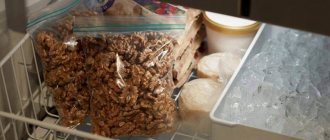Maria_Ivanova22 — Oct 23rd, 2021 Categories: How to store
Tags: How to store cheese
Few people can deny themselves the pleasure and not enjoy real Suluguni cheese from Georgia. It is not at all difficult to purchase it. This salty delicacy is sold in almost all large stores in smoked or raw form. Already at home, suluguni must be properly stored in order to preserve its amazing taste and pleasant aroma longer.
Ingredients: suluguni cheese Time to add: All year
There are several proven ways to store “Georgian mozzarella” in a regular kitchen, which will prolong its freshness.
Proper storage of suluguni in the refrigerator
Under no circumstances should you simply leave purchased Georgian cheese on the kitchen table. In such conditions it will deteriorate in a few hours. Therefore, the best place to store cheese is the refrigerator. It is worth noting that if the product packaging indicates a shelf life of more than 10 days, then this point should alert you: such cheese contains preservatives. The temperature of the refrigeration device must be constant; +5 °C is considered optimal. “Warmer” indicators can destroy the cheese structure, and this directly affects the taste.
Suluguni lovers know that the most delicious cheese is the one sold in brine. In addition, such a product has a longer shelf life of 30 days. Since suluguni can be stored for a maximum of 10 days without saline solution, housewives with experience have learned to prepare the brine themselves. To do this, you just need to dilute 400 grams of salt in a liter of water. You can pour this brine into the suluguni (properly change it from time to time) and place it in a refrigeration device.
Advantages and disadvantages of freezing in the freezer
You can freeze dairy products, but do not forget the well-known rules:
- Hard cheese is cut into thin pieces. Small portions are wrapped in a plastic bag. After all, all defrosted fermented milk product will need to be used immediately. Moreover, it will become suitable only for use in hot dishes.
- Parmesan can easily withstand being in the freezer for 1.5-2 months.
- The shelf life of paste varieties when frozen increases from a week to several months. But then the cheeses will only be suitable for spreading on pieces of bread.
- The quality of soft varieties does not suffer when they are in the freezer. But under one condition - it is in an airtight container so that the original snack is not saturated with odors and is not saturated with moisture.
- Blue cheese can also be frozen in store-bought packaging.
- The grated dairy product is placed in a plastic bag and wrapped tightly so that there is no air. It is not defrosted, but used for preparing hot dishes.
The shelf life of fermented milk products in the freezer should not exceed 5-6 months. After this period, the taste of the cheese decreases significantly.
Cheeses are defrosted in several stages. First - in the refrigerator, then - at room temperature. A microwave cannot be used for this purpose. The dairy product will simply melt in it. Hot water is not used either. In it, the fermented milk product will turn into an inedible mess.
Container for storing suluguni in the refrigerator
The packaging (it must be airtight) for storing suluguni in a refrigerator can be:
- a regular container with a lid;
- parchment or special paper for cheese;
- foil.
It is not advisable to pack cheese in a plastic bag or cling film, because it may “suffocate.” There is another interesting trick to extend the shelf life of suluguni by several days. It consists of placing a piece of refined sugar in a container with cheese, which will absorb excess moisture.
Tips and tricks
To preserve the taste of varieties in brine for a long time, the liquid must be changed every three days.
Some housewives resort to this trick to keep hard and semi-hard cheeses fresh. The pieces are wrapped in a regular paper napkin. Moreover, they take white specimens. The cheese is placed in a plastic container with a closed lid and put in the refrigerator. When the fermented milk product is taken out, the container is wiped with a dry towel and the napkin is replaced.
Some families prefer to buy processed cheeses. They are subjected to heat treatment during preparation and are good because they can remain intact for three to four days even at room temperature. But, like all dairy products, they are best placed in the refrigerator and stored according to the expiration date indicated on the label. If the original packaging is opened, the processed product must be consumed within a couple of days.
The most important thing is not to buy a lot of dairy products. After all, supermarkets are open seven days a week and offer a huge range of cheeses for different tastes, for people with different financial capabilities.
And in almost all populated areas the lights are often turned off. This means the refrigerator is getting warmer. Temperature changes are bad for any type of cheese.
The original snack is used to create hot or cold sandwiches or to prepare hot dishes. The taste of the finished product will depend on how the cheese is preserved.
You can freeze dairy products, but do not forget the well-known rules:
Some important points about storing Suluguni cheese in the refrigerator
You should not neglect several more factors when storing cheese from Georgia in a refrigeration device:
- it is not correct if the cheese is “adjacent” to products that have a strong or pungent aroma (it will absorb it very quickly);
- You should not place perishable food near smoked suluguni (harmful bacteria can “transfer” to the cheese);
- Do not allow sudden changes in temperature to occur in the refrigeration unit.
It is also worth mentioning that storing suluguni in the freezer is not entirely correct, although, in necessary cases, it is acceptable. Freezing adversely affects the taste of suluguni: it becomes dry, begins to crumble and loses its beautiful natural shade.
The main thing is to consider each of the rules as an important point, and then Georgian cheese will delight you with its taste for as long as possible.
Learn more about how to properly prepare brine for long-term storage of Suluguni cheese and feta cheese from the video.
Tweet
General storage rules
Cheese is a snack made from milk (usually cow's or goat's), using special microorganisms or by melting. Over the years, people have learned to produce original cheeses with different tastes and different hardnesses.
All varieties have their own storage characteristics. But there are also universal recommendations that require mandatory compliance:
- The best place to find a fermented milk product is in the refrigerator. Indoors, microorganisms quickly settle and multiply on cheese, and the cheese spoils. And during the summer heat it melts, subsequent cooling harms the taste and structure.
- The appetizer is first wrapped in baking parchment and then placed in a plastic container. This procedure will help maintain the desired percentage of humidity and remain soft for a long time.
- Smoked cheeses last longer than regular cheeses and cannot be stored in the same container.
- If mold is found on a regular fermented milk product, it is immediately cut off, and the cheese is used to make hot sandwiches or pizza, the remaining piece is placed in the freezer. It is worth remembering that the appearance of even a small area of mold indicates that the entire product is contaminated, because spores penetrate inside with great speed.
- Particularly advanced housewives purchase newfangled cheese pans with a device to ensure the required humidity inside (approximately 80-90%). After all, such parameters are not maintained inside the refrigerator. Moreover, the device does not allow odors to enter, which means that the natural aroma of the original snack will remain for a long time.
In order not to confuse the date of purchase of the cheese, you need to write it on a sticker and stick it to the container in which the delicacy is located.
Homemade cheese
Suluguni ripens in brine. This process must be kept under control. It is necessary to constantly check the condition of the cheese and the quality of the brine itself. If the surface of the liquid begins to form a film and an unpleasant odor appears, the brine will need to be immediately replaced with fresh one.
Homemade suluguni, like factory-made ones, should be transported in wooden boxes. The inside of the boxes should be lined with parchment or similar material. This product should be consumed no later than 5 days from the date of manufacture.
Brine cheeses: feta, feta cheese, suluguni, chechil (it is often confused with suluguni) must be stored according to certain rules. Like all dairy products, they have a very short shelf life and can spoil within a short period of time. Therefore, it is advisable not only for those who produce it, but also for consumers of this product to understand the issue of how to store Suluguni cheese.
Features of storing different types of cheese
The method and duration of storage largely depends on the type of cheese.
Solid varieties can be stored at home for up to 15 days, and a whole head can be stored for up to 2 months (in intact original packaging). It is important to provide the product with correct storage conditions. The optimal temperature is +5...8 ℃, and air humidity is more than 85%.
Varieties such as Gruyere, Cheddar and Parmesan can be stored for up to 1 month. Periodically check the product for mold and cut off affected areas. The larger the piece, the better and longer it lasts.
Hard cheeses can be stored in the freezer for up to 3 months. Thaw the product immediately before use. However, be prepared for the fact that after freezing the cheese will not be as aromatic and tasty as fresh.
To preserve the flavor of the product, wrap it in cotton cloth soaked in salt water and then in foil. Store this cheese on the shelves of the refrigerator.
How many days can soft cheeses ? On average, the shelf life is 3 days at a temperature of +4...5 ℃ and air humidity of 90%.
If mold appears on the product, the entire piece must be discarded. Cutting off the affected area will not bring the desired result. Due to the soft structure of cheese, pathogenic microorganisms quickly attack the entire product.
Brined cheeses (feta, suluguni, Ossetian or Abkhazian) require special storage conditions They should be kept in salted brine in a glass or enamel container. Shelf life – 1-2 months at temperatures up to +8 ℃.
If the cheese is too salty, soak it in milk for 8-10 hours before serving. Do not pour hot water into the product. This will not only lead to a loss of beneficial properties, but will also make the cheese stringy.
To successfully store homemade cheese at home, periodically check the brine product. If a film appears on the surface, replace the brine with fresh one. It is recommended to eat goat or sheep cheeses as quickly as possible, since their shelf life does not exceed 3 days.
There is an opinion that cottage cheese also refers to pickled cheeses. However, it should be stored in glass packaging and without brine.
Processed cheese in an opened package can be stored for no more than 2-3 days. After this period, it dries out, changes structure and loses its original taste.
blue cheese, wrap it in cling film and then place it in an airtight container. This will prevent its specific aroma from spreading throughout the refrigerator.
Fine varieties (Camembert, Roquefort, Brie, Dor Blue, etc.) are not advisable to store in the refrigerator, as they love warmth.
Adyghe cheese in vacuum packaging or in an airtight glass container. Proper storage organization will allow you to preserve the product for up to 1 month.
Smoked braid cheese must be stored at a temperature of 0…+4 ℃ and humidity up to 85%. The shelf life of the product is 75 days in vacuum packaging and 7-10 days in parchment.
to store tofu cheese in its original packaging in the refrigerator. If the container is damaged, transfer the product to an airtight container or zip-lock bag. This product requires constant high humidity. To extend the shelf life, fill it with distilled water, but do not forget to change it daily to prevent the growth of bacteria.
Cheese is a valuable product that has a special taste, aroma and is characterized by a high protein content. To preserve it for a long time, follow simple rules, taking into account the variety and observing the recommended expiration date. It’s best to buy only as much cheese as your family can eat within a few days.
Composition and calorie content of cheese
Suluguni is a natural product containing many nutrients that support the coordinated functioning of organs and systems , these are:
- vitamins: B1, B2, E, C, D, PP, A;
- mineral elements: calcium, iron, sodium, magnesium, sulfur, phosphorus, potassium.
100 g of suluguni contains:
| Components | Quantity, % |
| Squirrels | 20,5 |
| Carbohydrates | 0,4 |
| Fats | 22 |
| Water | 51,9 |
| Ash | 5 |
| Fatty acid | 14 |
| Organic acids | 1,5 |
| Disaccharides | 0,4 |
Although the product contains a small amount of carbohydrates, its energy value is quite high: per 100 g there is an average of 300 kcal.
The calorie content of suluguni depends on its type, method of preparation and additional processing:
| Fried | 376 kcal |
| Smoked | 255 kcal |
| Home | 283 kcal |
Do you use expired food for cooking at home?
Yes, the main thing is to process it if it is meat or expired kefir for pancakes.
27.72%
No, it is very dangerous and not useful.
36.37%
If the products have fungus or mold, then we throw them away; if they are a couple of days past their expiration date, we use them for food, even without heat or other treatment.
35.91%
Voted: 1952
Advantages and disadvantages of Suluguni
Of particular note is not only the taste of the product, but also its beneficial properties. After all, suluguni contains a large amount of vitamins and minerals. Thanks to enzymes, the cheese does not have any third-party flavors. This product is primarily recommended for elderly people, expectant mothers and children. Naturally, we are talking exclusively about natural suluguni, without any chemical additives. Such, one might say, fakes, unfortunately, are also found on sale. Therefore, when choosing suluguni, you need to be very careful.
By regularly eating a natural product, you can normalize the functioning of the nervous and cardiovascular systems, adjust hormonal levels, and increase the level of hemoglobin in the blood. Suluguni also helps strengthen the immune system in general. In addition, by regularly consuming suluguni in reasonable quantities, you can prevent the development of a number of serious diseases, one way or another related to the cardiovascular system. It should also be noted that this cheese has a positive effect on human hair, nails and skin. In addition, the product can also improve the permeability of blood vessels and increase their elasticity.
Suluguni can only harm people who have individual lactose intolerance. Unfortunately, they will have to refuse this product. Also, when consuming the product, do not forget about a sense of proportion. After all, even the most effective medicine can become poison if you drink it in large quantities. This also fully applies to food products. Only what is consumed in moderation is beneficial. Speaking about suluguni, it is worth adding that only cheese that does not contain any synthetic additives will be useful. In other words, you should only eat natural products made using a certain technology.
Requirements for conditions, storage time and sale in retail trade
- Cheese products should be stored in refrigerators or cabinets at a temperature of 2 to 8°C.
- Products should be placed separately from products that have a specific aroma (the rules for product proximity, placement and storage standards for food products are described in detail in this article).
- Cheeses in containers are laid out on shelves, without containers only on racks.
- Brine varieties are stored in containers with brine.
- Cheeses, after being packaged in polymer film under vacuum, can be stored in stores at a temperature not exceeding 8°C for 5 days.
- The shortest sales period for soft cheeses is up to 120 hours; a longer period is provided for hard and brine cheeses - up to 15 days.
How to properly store different types of cheese - in the refrigerator and without
Cheese is very versatile: it is suitable for both festive and everyday tables, it is consumed at home and in restaurants, they drink wine with it and eat pasta, adults and children adore it, it is included in many dishes, and the huge variety of its varieties allows cover a rich table with this product alone. In addition, cheese contains a lot of calcium and phosphorus; its consumption has a beneficial effect on the musculoskeletal system, improves vision, skin condition and heart function. Naturally, you always want to keep such a valuable product at home, and since it is more profitable to buy in bulk, many owners stock up on it for future use. But you should only do this if you know how to properly store cheese. Otherwise, this expensive delicacy may dry out or become moldy, which will not benefit the family budget.











